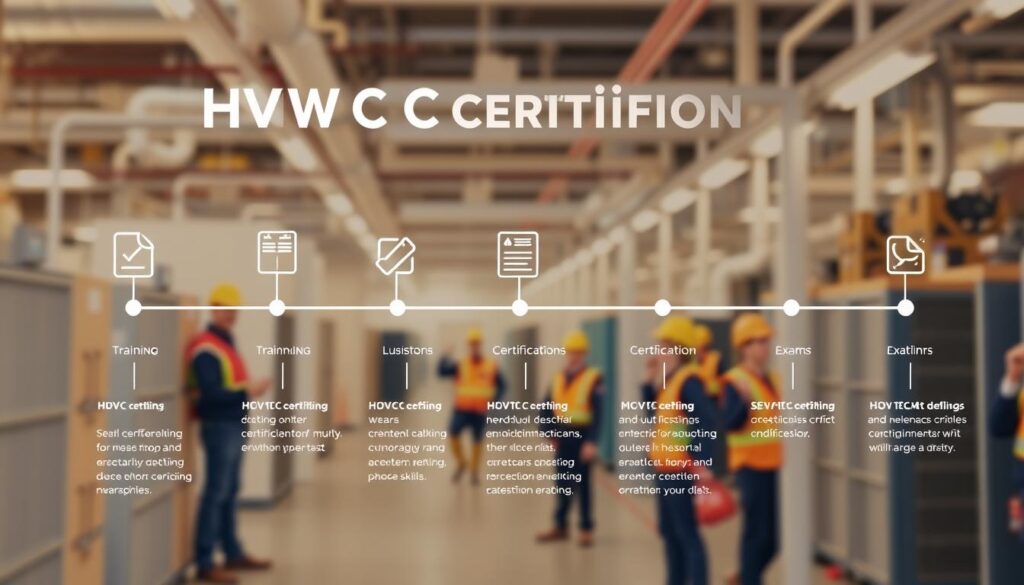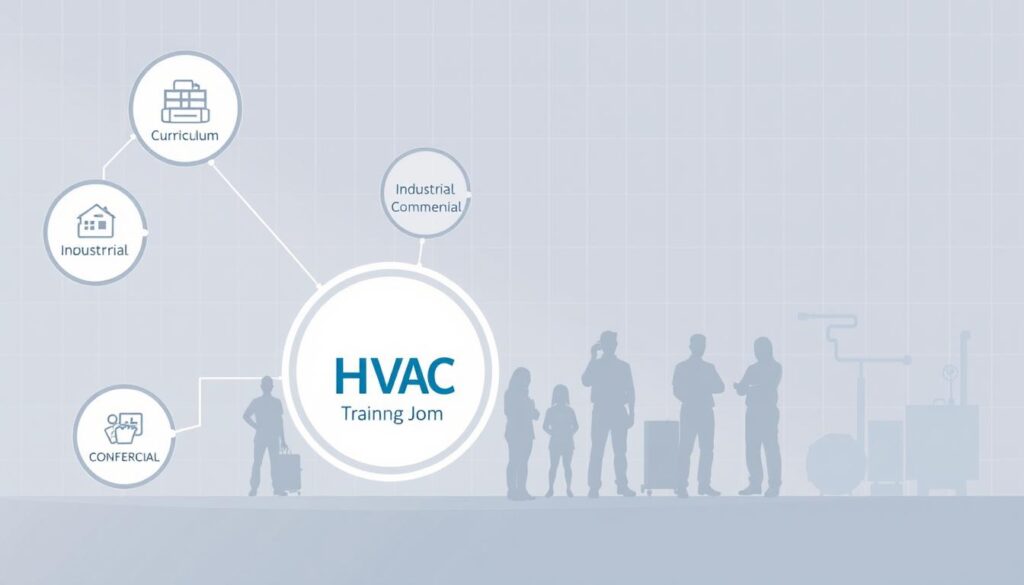Affiliate Disclosure
HVAC Guide Guys is a participant in the Amazon Services LLC Associates Program, an affiliate advertising program designed to provide a means for sites to earn advertising fees by advertising and linking to Amazon.
How Long to Get HVAC Certification? Ever wondered how quickly you could start a new career in HVAC? Becoming a certified HVAC technician might take less time than you think. Knowing how long it takes to get certified can help you plan your career.

The HVAC industry is full of exciting opportunities for those ready to start a technical career. You can choose from different paths, whether you’re interested in HVAC installation or want a full training program. Getting certified is key in most of the United States, opening doors to good jobs.
Depending on your choice, you could finish HVAC training in as little as 9 months at places like Summit College. Programs vary from quick certificates to two-year associate degrees. This gives you options to fit your career goals and schedule.
Key Takeaways
- HVAC certification can be completed in 9-24 months
- Multiple training paths are available nationwide
- Certification is required in most US states
- Employment growth for HVAC technicians is projected at 5%
- Training programs offer financial aid and support
- Median annual wage for HVAC technicians is $48,730
Table of Contents
Understanding the HVAC Certification Landscape
The HVAC industry is growing fast. It has 415,800 heating, air conditioning, and refrigeration mechanics in the United States. To succeed, professionals must understand the complex certification landscape.
HVAC certification shows you’re an expert and dedicated to high standards. It proves you can handle the complex tasks of installing and replacing HVAC systems.
What is HVAC Certification?
HVAC certification is a formal way to show your technical skills and professionalism. It includes:
- Proof of technical expertise
- Validation of industry-specific skills
- Demonstration of safety and compliance understanding
- Recognition by professional organizations
Why Certification Matters
Certification is key for your career growth. It can:
- Increase job marketability
- Potentially boost earning power
- Give credibility with employers and clients
- Open doors to advanced career opportunities
Industry Standards and Requirements
The HVAC industry has strict standards for quality and safety. Certification usually involves:
- Technical training programs
- Standardized examinations
- Ongoing professional development
- Compliance with local and national regulations
Certification is not just a credential—it’s a commitment to excellence in the HVAC profession.
Explore Our HVAC Shop
Looking for top-rated HVAC tools, parts, and accessories? Visit our shop and find the perfect solution for your needs.
Visit the ShopEssential HVAC Certifications and Licenses
Knowing the right HVAC certifications can really boost your career. They show you’re skilled and ready for big challenges in HVAC. Professional certifications open doors to more chances in the HVAC world.
- EPA 608 Certification – Required for handling refrigerants
- NATE Certification – Industry-recognized professional credential
- HVAC Excellence Certification – Advanced professional development
- Manufacturer-Specific Certifications – Specialized technical training
Certifications can make you better at planning HVAC projects. Employers like certified techs more. They can earn 10-20% more than those without certifications.
The EPA 608 Certification is key, with four levels for different refrigerant needs. Each level shows you’re good at managing different HVAC systems.
Professional certifications are not just credentials—they’re your passport to career advancement in the HVAC industry.
Staying committed to learning and getting certified can really help your career. It shows you’re serious about being the best in HVAC technology.
How Long to Get HVAC Certification: Timeline Overview
Getting HVAC certification takes time and involves different steps. You’ll need to understand the timelines and requirements for each type of certification. This journey affects how you schedule HVAC services and how long it takes to find a contractor.
For those aiming to be HVAC technicians, knowing the certification timeline is key. The path includes various stages and can last from months to years. This depends on your chosen path and specific needs.
EPA 608 Certification Duration
The EPA 608 Certification is essential for HVAC pros working with refrigerants. It usually takes 1-2 weeks to finish. You’ll need to prepare for the study, register for the exam, and pass the test.
NATE Certification Requirements
NATE certification is a deeper professional achievement. It can take 3-6 months to get. You’ll need to pass a core knowledge exam, a specialty exam, and show practical experience.
State Licensing Timeframes
State licensing is the last step, taking 6 months to 2 years. Important factors include:
| Licensing Component | Estimated Duration |
|---|---|
| Practical Experience | 12-24 months |
| Exam Preparation | 3-6 months |
| Licensing Application | 1-3 months |
Your exact timeline depends on your situation, experience, and local rules. Planning ahead can make your journey smoother and more efficient.
Training Options and Educational Paths

Exploring HVAC certification reveals many educational paths. Each offers benefits for starting your HVAC career. They help prepare you for the job and your future in the field.
Your main training options are:
- Trade School Programs
- Community College Courses
- Online Learning Platforms
- Apprenticeship Programs
Trade school programs are the quickest way into HVAC. They last from 10 to 24 months. This lets you quickly learn the skills and get certified.
| Training Option | Duration | Key Benefits |
|---|---|---|
| Trade School | 10-24 months | Accelerated learning, hands-on training |
| Community College | 2 years | Associate degree, broad curriculum |
| Online Courses | 6-18 months | Flexible schedule, learn at your pace |
| Apprenticeship | 3-5 years | Wages while learning, real-world skills |
Online learning platforms offer flexible HVAC courses. They prepare you for certifications. You can learn at your own pace, fitting it into your work schedule.
Apprenticeships are great for those wanting real, hands-on experience. They last 3-5 years but you earn wages. You also get skills directly useful for HVAC jobs.
Explore Our HVAC Shop
Looking for top-rated HVAC tools, parts, and accessories? Visit our shop and find the perfect solution for your needs.
Visit the ShopHVAC Trade School Programs: Duration and Benefits
Choosing the right HVAC training program is key to your career. Trade schools offer flexible, focused paths. They prepare you for the HVAC world.
HVAC trade school programs are designed to quickly start your HVAC career. They offer many benefits for those looking to learn fast.
Six-Month Accelerated Programs
Accelerated programs are the quickest way into HVAC. They include:
- Fundamental technical skills training
- Hands-on laboratory experiences
- Preparation for essential certification exams
- Targeted curriculum focusing on practical applications
Standard Program Length
While six-month programs are fast, standard programs last 12 to 24 months. These programs offer deeper training and more skills.
| Program Type | Duration | Credit Hours |
|---|---|---|
| Certificate Program | 6-12 months | 30 credits |
| Diploma Program | 12-24 months | 36-45 credits |
| Associate Degree | 18-24 months | 60 credits |
Hands-on Training Components
Practical training is key in HVAC education. Students get real-world experience through:
- Equipment installation workshops
- Diagnostic and repair simulations
- Climate control system analysis
- Safety protocol training
By picking the right trade school, you can learn fast. This prepares you for a successful HVAC career.
Apprenticeship Routes to HVAC Certification

Starting an HVAC apprenticeship is a great way to learn your trade. These programs offer deep learning experiences. They go beyond classroom learning, helping you get practical skills for real HVAC jobs.
Apprenticeships last 3 to 5 years. They mix on-the-job training with classroom learning. You’ll learn key skills that help you work efficiently and become a pro in HVAC.
- Learn hands-on technical skills
- Receive mentorship from experienced professionals
- Earn while you learn
- Develop a deep understanding of HVAC systems
Math skills are important in your apprenticeship. You’ll need to know algebra, geometry, and blueprint reading. These skills help you understand and work on complex HVAC systems.
| Apprenticeship Stage | Duration | Key Learning Objectives |
|---|---|---|
| First Year | 12 months | Basic system understanding |
| Second Year | 12 months | Advanced technical skills |
| Third Year | 12 months | Complex system integration |
| Fourth Year | 12 months | Professional certification preparation |
| Fifth Year | 12 months | Specialized expertise |
Choosing an apprenticeship means you’re investing in your future. It’s a strong way to grow professionally in the HVAC field.
Explore Our HVAC Shop
Looking for top-rated HVAC tools, parts, and accessories? Visit our shop and find the perfect solution for your needs.
Visit the ShopCommunity College vs. Technical School Programs
Choosing the right path for your HVAC career is important. You need to know the differences between community college and technical school programs. This choice can affect your ability to complete HVAC projects and schedule services.
Both paths have their own benefits for those wanting to work in HVAC. Let’s look at the main differences that can guide your career.
Associate Degree Timeline
Community college HVAC programs last two years. They offer:
- Wide technical knowledge
- General education courses
- A chance to get advanced degrees
- Usually takes 24 months to finish
Technical Certificate Duration
Technical schools provide quick, job-focused training. Their programs are shorter:
- Last 6-12 months
- Focus on specific job skills
- Get you working faster
- Teach skills for quick job entry
Program Cost Comparison
Cost is a big factor in choosing your education. Here’s a quick look:
| Program Type | Average Duration | Estimated Cost |
|---|---|---|
| Community College | 2 years | $5,404-$11,632/year |
| Technical School | 6-12 months | $2,000-$3,000 total |
Your choice depends on your career goals, budget, and how soon you want to start working in HVAC.
Manufacturer-Specific Certifications and Timeframes
Getting manufacturer-specific certifications can really help your HVAC work go faster. These special badges show you know a lot about certain brands and tech.
Top brands have their own certification programs. These programs check if a technician really knows their stuff. They usually need:
- Going to in-depth training sessions
- Passing tough exams on specific equipment
- Showing they can use what they’ve learned
Each brand has its own way of getting certified. For example, Carrier Factory Authorized Dealer certification is a tough program. It can take 1-3 months to finish.
| Manufacturer | Certification Duration | Key Focus Areas |
|---|---|---|
| Carrier | 2-3 months | Advanced HVAC system installation |
| Trane | 1-2 months | Commercial and residential system maintenance |
| Lennox | 3 months | Energy-efficient system design |
These certifications can make your HVAC work go faster. They show you’re serious about being great at your job. Getting these badges can really help you do better and faster.
Explore Our HVAC Shop
Looking for top-rated HVAC tools, parts, and accessories? Visit our shop and find the perfect solution for your needs.
Visit the ShopCareer Advancement Through Additional Certifications
As you move up in your HVAC career, getting more certifications is key. Knowing how long it takes to get these advanced credentials can really boost your pay and job chances. Experienced techs who get extra training often make more money, up to $32.83 an hour.
Getting a Universal EPA Certificate can lead to more challenging HVAC jobs. Employers like techs with many certifications, like those for different refrigerant systems. NATE certifications, like the HVAC Support Technician Exam, show you’re ready for leadership roles.
Getting the right certifications can change your HVAC career path. By keeping your skills up with training, you become more valuable. These certifications not only make you more attractive to employers but can also increase your yearly income.
Showing you’re always learning tells employers you’re serious about your job. With almost 100% job openings everywhere, getting more certifications keeps you ahead in a changing field. Keep learning to succeed long-term in HVAC.
FAQ
How long does it typically take to get HVAC certified?
What are the key certifications I need to become an HVAC technician?
Is a trade school or apprenticeship better for HVAC certification?
How much does HVAC certification cost?
How long does it typically take to get HVAC certified?
What are the key certifications I need to become an HVAC technician?
Is a trade school or apprenticeship better for HVAC certification?
How much does HVAC certification cost?
FAQ
How long does it typically take to get HVAC certified?
Getting HVAC certified can take different amounts of time. Trade schools can take 6 months to 2 years. Community college programs usually take 2 years. Apprenticeships last 3-5 years, mixing classroom and on-the-job training.
What are the key certifications I need to become an HVAC technician?
You’ll need the EPA 608 Certification, NATE certification, and state-specific licenses. Each one has its own time frame, from a few weeks to several months.
Is a trade school or apprenticeship better for HVAC certification?
Both have their benefits. Trade schools are quicker (6-24 months) with classroom learning. Apprenticeships offer 3-5 years of hands-on training. Your choice depends on your learning style and career goals.
How much does HVAC certification cost?
Costs vary a lot. Trade schools cost
FAQ
How long does it typically take to get HVAC certified?
Getting HVAC certified can take different amounts of time. Trade schools can take 6 months to 2 years. Community college programs usually take 2 years. Apprenticeships last 3-5 years, mixing classroom and on-the-job training.
What are the key certifications I need to become an HVAC technician?
You’ll need the EPA 608 Certification, NATE certification, and state-specific licenses. Each one has its own time frame, from a few weeks to several months.
Is a trade school or apprenticeship better for HVAC certification?
Both have their benefits. Trade schools are quicker (6-24 months) with classroom learning. Apprenticeships offer 3-5 years of hands-on training. Your choice depends on your learning style and career goals.
How much does HVAC certification cost?
Costs vary a lot. Trade schools cost $1,500 to $15,000. Community college degrees are $10,000 to $30,000. Apprenticeships are often free or paid. Certification exams cost $50 to $300 each.
Do I need different certifications for residential and commercial HVAC work?
Yes, you might need different certifications for residential or commercial work. Getting manufacturer-specific certifications and specialized training can open more job doors. Many technicians get multiple certifications.
What is the EPA 608 Certification, and why is it important?
The EPA 608 Certification is needed for HVAC technicians working with refrigerants. It has four types, with Universal being the most complete. It usually takes 1-2 weeks to get and is essential for legal refrigerant handling.
Can I work in HVAC without being fully certified?
Most states require some certification or license for HVAC work. You might start as an apprentice or helper. But, you’ll need full certifications to work alone. Some jobs are available with partial certification.
How often do I need to renew my HVAC certifications?
Renewal times vary. EPA 608 Certification needs renewal every 5 years. State licenses and other certifications have different cycles. You’ll need to keep learning to renew your certifications.
What are the best ways to prepare for HVAC certification exams?
Good preparation includes trade school or college, preparatory courses, study guides, and practice exams. Hands-on experience through apprenticeships or entry-level jobs is also key. Many schools offer exam prep in their programs.
Can online training help me get HVAC certified?
Online training is useful for learning theory. But, most certifications require practical experience. Look for programs that mix online learning with hands-on training for best preparation.
,500 to ,000. Community college degrees are ,000 to ,000. Apprenticeships are often free or paid. Certification exams cost to 0 each.
Do I need different certifications for residential and commercial HVAC work?
Yes, you might need different certifications for residential or commercial work. Getting manufacturer-specific certifications and specialized training can open more job doors. Many technicians get multiple certifications.
What is the EPA 608 Certification, and why is it important?
The EPA 608 Certification is needed for HVAC technicians working with refrigerants. It has four types, with Universal being the most complete. It usually takes 1-2 weeks to get and is essential for legal refrigerant handling.
Can I work in HVAC without being fully certified?
Most states require some certification or license for HVAC work. You might start as an apprentice or helper. But, you’ll need full certifications to work alone. Some jobs are available with partial certification.
How often do I need to renew my HVAC certifications?
Renewal times vary. EPA 608 Certification needs renewal every 5 years. State licenses and other certifications have different cycles. You’ll need to keep learning to renew your certifications.
What are the best ways to prepare for HVAC certification exams?
Good preparation includes trade school or college, preparatory courses, study guides, and practice exams. Hands-on experience through apprenticeships or entry-level jobs is also key. Many schools offer exam prep in their programs.
Can online training help me get HVAC certified?
Online training is useful for learning theory. But, most certifications require practical experience. Look for programs that mix online learning with hands-on training for best preparation.

